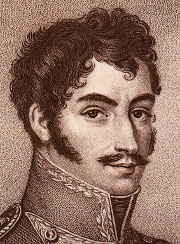
South American Military Dictators
In the late 20th century, it was a common rhetorical ploy of the more "revolutionary" Left in the "Western" world simply to ignore democracy as an alternative to Communism. Instead they would excuse the brutalities of Communism by pointing to the brutalities of the then numerous military dictatorships of Southern Europe and Latin America and pretend that such regimes were the only alternative to Communism. These regimes were led by generals who might in various ways be seen as conservative (though Peron was undisputably Leftist) so do they tell us anything about conservatism?
Historically, most of the world has been ruled by military men and their successors (Sargon II of Assyria, Alexander of Macedon, Caesar, Augustus, Constantine, Charlemagne, Frederick II of Prussia etc.) so it seems unlikely but perhaps the main point to note here is that the Hispanic dictatorships of the 20th century were very often created as a response to a perceived threat of a Communist takeover. This is particularly clear in the case of Spain, Chile and Argentina. They were an attempt to fight fire with fire. In Argentina of the 60s and 70s, for instance, Leftist "urban guerillas" were very active -- blowing up anyone they disapproved of. The nice, mild, moderate Anglo-Saxon response to such depredations would have been to endure the deaths and disruptions concerned and use police methods to trace the perpetrators and bring them to trial. Much of the world is more fiery than that, however, and the Argentine generals certainly were. They became impatient with the slow-grinding wheels of democracy and its apparent impotence in the face of the Leftist revolutionaries. They therefore seized power and instituted a reign of terror against the Leftist revolutionaries that was as bloody, arbitrary and indiscriminate as what the Leftists had inflicted. In a word, they used military methods to deal with the Leftist attackers. So the nature of these regimes was only incidentally conservative. What they were was essentially military. We have to range further than the Hispanic generals, therefore, if we are to find out what is quintessentially conservative.
It might be noted, however, that, centuries earlier, the parliamentary leaders of England -- led by Fairfax, Cromwell etc. -- did something similar to the Hispanic generals of the 20th century. Faced by an attempt on the part of the Stuart tyrant to abrogate their traditional rights, powers and liberties, they resorted to military means to overthrow the threat. There is no reason to argue that democracy cannot or must not use military means to defend itself or that Leftists or anyone else must be granted exclusive rights to the use of force and violence.
Bolivarism

It might also be noted that the Hispanic generals were operating within a very different tradition. The abiding hero of Latin America is Simon Bolivar, the great liberator. But the ideas about government put forward by Bolivar were very authoritarian -- ideas about how the masses need to be "educated" and generally dominated by a self-chosen elite -- ideas that put Bolivar in the company of men like Mussolini and Lenin -- ideas that are totally outside the democratic traditions of Anglo-Saxon conservatism. He was thoroughly Fascist once he had wrenched control from the feeble hands of the Spanish monarchy. Bolívar proclaimed himself dictator on 27 August 1828
Excerpt:
"Education was also touched upon by Simon Bolivar, especially in his Essay on Public Education, as a tool for governments to re-educate their citizens to the responsibilities and duties of participation in public life. Bolivar also commented on the weaknesses and limits of liberal democracy when writing to explain the necesity of a strong, republican form of government.... Spanish American people required that their new states be organized in such a way as to maintain order by checking the popular forces until they could be trained in the civic virtues. Bolivarism emphasizes the common good over the individual"The Hispanic generals were doing very little more than putting Bolivarism into practice and Bolivarism was certainly not conservatism.

 Eugenio Pacelli, a righteous Gentile, a true man of God and a brilliant Pope
Eugenio Pacelli, a righteous Gentile, a true man of God and a brilliant Pope
No comments:
Post a Comment